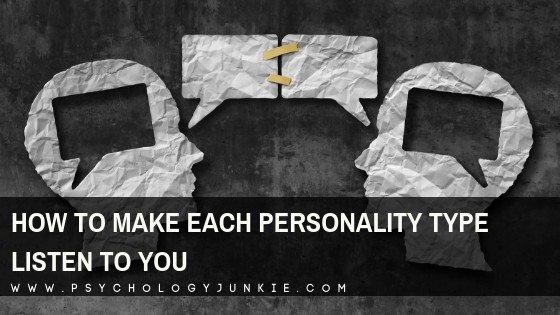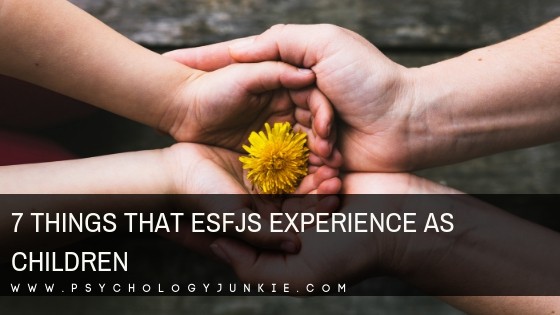How to Make Each Personality Type Listen to You
Have you ever felt like certain people just tune you out? Maybe you’re going on a date with someone and you want to make a good impression, but you’re worried you’ll trip up? Communication can be tricky even for the smoothest people out there. But an understanding of personality type can make it quite a bit easier! Today we’re going to take a look at how to speak in a way that makes each personality type really listen and pay attention. Let’s get started!
Not sure what your personality type is? Take our new personality questionnaire!

Table of contents
Estimated reading time: 11 minutes
How to Make Each Personality Type Listen to You
The Intuitive-Feeling (NF) Personality Types
Intuitive-Feeling personality types (NFs for short) respond to imaginative, dramatic language. This doesn’t mean they are necessarily dramatic people, but they instantly stop and take notice when someone is talking about something that seems to overflow with meaning and significance to them. They are attracted to metaphor and big-picture, futuristic ideas and possibilities. They appreciate people who reference their values, their concern for others and personalize communication with questions and empathetic language. Diplomacy and tact is important as well, especially to Feeling-Judging personality types. Remember to give them a chance to speak rather than hijacking the entire conversation.
ENFPs
Get ready to brainstorm with these types! They want to extrapolate, hypothesize, and explore many possibilities and connections. Challenge their creativity and acknowledge their unique perspectives and ideas. These types want options and they hate being limited. Try not to impose a lot of rules or structure on the conversation if you can. Appeal to their sense of the possible and their enthusiasm for the future and the theoretical. Novelty and originality excite them.
INFPs
These types need time for reflection, revision, and imagination in conversation. Don’t overburden them with lots of details or expect immediate answers. Spike their curiosity by talking about psychology or spirituality (without being pushy about it) and ask their thoughts about things. Be non-judgmental and curious about how they see the world. They are deeply passionate, but may not always show it until they trust someone deeply. Before you’ve reached this point you can often get a conversation going by asking them about their favorite books, movies, or songs. They often have favorite stories or songs that express their inner values in some way. Whatever you do, don’t mock one of their principles or values. Show open-mindedness and gentleness in your approach.
Read This Next: 25 Quotes that INFPs Will Instantly Identify With
ENFJs
Intimacy and empathic connection is what ENFJs want in a conversation. Meaningful, authentic conversations draw them in like a magnet. They want to know your deepest feelings, your opinions, and the psychology of what makes you tick. They want to discuss the future implications of things that are happening today and explore personal goals and plans. ENFJs are usually big proponents of personal development so conversations about growth, spirituality, psychology, and human potential tend to excite them.
Read This Next: The Shadow of the ENFJ Personality Type
INFJs
INFJs love conversations that revolve around meanings, potential, and significant relationships. These types tend to tune out of nitty-gritty, day-to-day topics or small talk. Yet they love raw conversations about the meatier parts of life; why we’re here, what our purpose is, and the emotional depths we experience. Ask for their ideas about a project you’re working on or insight into your theories or relationships. Appeal to their creativity and let them extrapolate or predict. They enjoy imagining and envisioning, and they’re very good at seeing connections, themes, and patterns. Fit regular pauses into a conversation so that they can process everything you’re saying without feeling pressured to make a quick response.
Read This Next: 3 Weird and Wonderful Secrets About the INFJ Personality Type
The Intuitive-Thinking (NT) Personality Types
Intuitive-Thinking personality types (NTs for short) are attracted to conceptual, theoretical conversation. They want to extrapolate or envision future possibilities and innovative solutions. They tend to respond to scholarly language and precise words. They are curious and non-traditional and enjoy coming up with original solutions to problems. Debate isn’t something that scares away NTs, in fact, if anything it appeals to them more than gracious conversation. They enjoy arguing a topic until the truth is discovered and they are usually able to have friendly discourse and arguments without feeling emotionally disrupted.
ENTPs
If you want to get an ENTPs attention bring up something novel, original, or off-the-wall. They want to venture into uncharted territory and explore theories, possibilities, or new solutions and discoveries. They hate being overloaded with details, though, so try not to go overboard with all the nitty-gritty stuff (but know your facts). Be sure to give them time to debate or ask questions. Keep in mind that they are attracted to things that are new and different and less attracted to small talk or a re-hashing of old experiences. Phrases like, “This is the way it’s always been done”, or “If it ain’t broke don’t fix it” tend to signal boredom to them.
INTPs
Creative and analytical, INTPs enjoy a thought-provoking conversation that makes them do some mental gymnastics. Troubleshooting a problem, coming up with an innovative solution, “noodling” ideas around with other people, these kinds of things all excite them. They are often interested in technology, philosophy, hypothetical scenarios, or an eclectic mixture of books, movies, and music. Just be sure to respect their privacy when you’re speaking to them because they hate to be interrogated or put on the spot emotionally. Probing into their personal life is a major no-no unless you already have a great deal of trust established.
Read This Next: The Unique Intelligence of the INTP, INFP, ENTP and ENFP Personality Types
ENTJs
With ENTJs, it’s important to get to the point in a conversation. They hate feeling like they’re wasting time so they can quickly become irritated if the conversation is overly-detailed or focused on mundane, day-to-day experiences. They enjoy problem-solving, strategizing, and figuring out long-range goals and objectives. They like debate, playing devil’s advocate, or troubleshooting complex projects. They also have a philosophical nature that tends to show up when they are relaxed and in a pressure-free environment. During these times anything from theology to music to life after death is fair game for conversation.
INTJs
If you want to get an INTJs attention, the best thing you can do is challenge their intellectual curiosity. They want their imagination engaged and they want to take apart theories and plans and make sense of them. Complexity is intriguing to them and they enjoy in-depth discussions about how things will likely play out in the future. Keep things logical with INTJs, and give them plenty of time to think over responses to your questions. Don’t probe too deeply into their personal lives if you don’t know them very well or overload them with small-talk or concrete details. Realize that they are more focused on the big picture than the nitty-gritty details of everyday life.
Read This Next: 10 Things You Should Never Say to an INTJ
The Sensing-Perceiving (SP) Personality Types
Sensing-Perceiving personality types are usually friendly, responsive, realistic individuals. They respond to rich storytelling and colorful anecdotes. They are attracted to easy-going, pragmatic people who have a sense of adventure and fun. They like to ask and explore solutions to real-world issues and problems and, while they can enjoy theoretical conversation, they prefer it to have a practical application. As experiencers and realists, they enjoy brainstorming fun activities, opportunities, and possibilities in the real world. They detest being lectured, controlled, or talked over.
ESTPs
Animated, charming, and action-oriented, ESTPs tend to be extremely down-to-earth and direct. They are attracted to good-natured, lively conversations that are filled with humor or friendly debate. It’s extremely important for ESTPs to see a pragmatic outcome to any kind of in-depth discussion. Talking just to talk is rarely interesting to them. They also dislike it when people beat-around-the-bush rather than getting right to the point. Appeal to their desire for action, experience, and opportunity.
ISTPs
These types get burned out by a lot of conversation so it’s important not to overload them with it. If you have something to say, get straight to the point and make sure you have logical reasons to back up your claims. Ask for practical solutions; impart knowledge with real-life experience to back it up. Use humor and friendly banter to keep the conversation lively. It’s important to listen carefully when they speak, because they’ve usually put a lot of thought into what they are going to say and they’re very sparing with their words. It’s also important to be conscious of their time and the fact that they tend to quickly tire of long conversations unless they are very invested in the relationship.
ESFPs
These enthusiastic personality types are drawn to conversation that is filled with humor, color, and excitement. Get their attention by talking about an experiences, outings, or opportunities they should enjoy. They love humor and storytelling, so mention anything funny or out-of-the-ordinary that happened in your day. Be sure not to beat around the bush or drone on and on, ESFPs are people of action and they enjoy mixing up conversation with activity. Use tact and be polite, but not overly formal. Also, be careful about probing too deeply into their personal lives if you don’t know them very well.
Read This Next: 10 Things You’ll Relate to if You’re an ESFP
ISFPs
Gentle but passionate, ISFPs appreciate people who ask their opinions without seeming pushy or overbearing. If you’re trying to explain something to an ISFP, be specific and explicit. They don’t like it when people beat around the bush or get overly abstract. They are realists and can get frustrated if the conversation doesn’t seem to have a practical purpose. Confide in them, ask their advice, or share an experience with them. They often enjoy talking about their favorite songs or TV shows because these things are usually very special to them and give them a way to express their values indirectly. Affirm their values and show compassion and courtesy to the people around you.
The Sensing-Judging (SJ) Personality Types
It’s important to remember that Sensing-Judging types are extremely pragmatic. They want there to be a point to every conversation. They want to do something with what they are learning or talking about. Extrapolating about theories or concepts just for the sake of it can interest them now and then, but they will quickly want to get back to realistic, concrete information. They appreciate people who are down-to-earth, grounded, and straightforward. A lot of pretentious, superfluous language tends to turn them off. They base their decisions on facts, personal experience, and authority and won’t be persuaded unless someone has facts or experience to back up their claims. It’s especially important to respect the experiences of SJ types and to ask about those experiences. They enjoy discussing things they have firsthand knowledge of.
ESTJs
Be frank, assertive, and direct with ESTJs. Don’t waste their time, beat around the bush, or try to win their approval through emotional appeals. If you want to capture their interest talk about a new skill you’ve learned, a new way to organize something, or a problem you’re trying to solve. They enjoy being asked for their advice, especially when it comes to planning or problem-solving. Be literal and explicit and linear – it bothers them when people are jumping around all over the place in time. Remember that these types value justice and fairness so don’t make exceptions or show biases.
ISTJs
Reserved, strong-willed, and precise, ISTJs appreciate people who are conscientious and direct. If you want their attention it’s important to respect their personal space and listen attentively when they’re speaking. They tend to feel uncomfortable around loud, showy people. They enjoy topics that have a practical purpose and especially enjoy being asked their opinion on how to solve a problem. They tend to have hobbies that they are passionate about and will appreciate being asked to share about those. If you’re trying to win an argument with an ISTJ be sure to use facts and logic to back up your claims. Don’t expect to win them over through emotional appeals or “gut” feelings.
ESFJs
Friendly and attentive, ESFJs are usually very easy to talk openly with. They are drawn to conversations where people are sharing their opinions, emotions, and feelings freely. They like being asked for advice about interpersonal issues and usually have a fair amount of wisdom to share in this area. Being polite is a must with ESFJs, they dislike rude or harsh dialogue. They love to be confided in and to help when someone feels stumped about a relationship. It’s important to remember that ESFJs are practical types, they like to offer solutions and enjoy discussing projects, activities, and plans.
ISFJs
Conscientious and reserved, ISFJs enjoy one-on-one conversation much more than group chatter. They feel most comfortable when a conversation is polite but intimate. They enjoy discussing relationships, plans, and shared experiences. They appreciate people who are specific, literal, and considerate. Keeping the volume of your voice down and taking regular pauses so that they can consider what you’re saying is important. Ask them about their experiences, their hobbies, their current projects. Respect their values and their personal space. These are all ways to spark a friendly conversation.
What Are Your Thoughts?
Did you enjoy this article or hate it? Do you have any experiences or insights to add? Let us know in the comments!
Find out more about your personality type in our eBooks, Discovering You: Unlocking the Power of Personality Type, The INFJ – Understanding the Mystic, The INTJ – Understanding the Strategist, and The INFP – Understanding the Dreamer. You can also connect with me via Facebook, Instagram, or Twitter!


Subscribe to Our Newsletter

Want to discover more about personality type? Get the inside scoop with Susan Storm on all things typological, along with special subscriber freebies, and discounts on new eBooks and courses! Join our newsletter today!










Enjoyed it! What tends to cause me trouble in conversations is that I’m often more interested in learning about the person who’s talking to me than what we’re actually talking about. I start wondering why they said something or what it means about them, and then have trouble bringing my mind back to the topic we’re discussing! I’m not sure if that’s an ESFJ problem or just me. ????
I’m an INTJ (I’ve formerly tested into that type) who just got over a (very brief) relationship with a woman I believe was an ESFJ.
I couldn’t deal with her. She wan incessantly telling me what was “wrong’ with me and requiring that I “fix” my “problems.” Because I like to have a few drinks or beers before I sit down to dinner she was constantly berating me for being “an alcoholic.” I tried to reason with her that a “cocktail hour” was a venerable western tradition and that it allowed on to put aside the stress and tension of the work day so that one could relax and enjoy a good meal at the end of the day.
She would have none of it. She took me to a restaurant that very pointedly served neither beer nor wine to (apparently) teach me a lesson. Needless to say I didn’t enjoy the meal but she got her way.
These types, ESFJs, seem to see it as their mission to “improve” people in their own rather parochial and superficial image. When these types are under stress they (or at least she) seem to resort to histrionics and melodrama. She sent me an email saying that because I was “perfect” (I never said or suggested I was and certainly am not) she couldn’t “help” me.
If this woman is a typical example of an ESFJ then this type is insufferable; There F function seems to make them want to relate to people but their Judging function seems to compel them to boss people around and their Sensing function seems to compel them to relate to the people they allegedly “care” about in a parochial and superficial manner.
One final anecdote to perhaps reveal the what one might call “ugliness” this type can display; this woman was in the process of moving her belongings to another apartment with her four children. She lost her temper and shouted to one of her children, “You’re not a member of this family any more!” I was thinking, “what kind of person says such a thing to her own children?!”
The next time I know I’m dealing with an ESFJ I’m politely leaving the room and not coming back
Hi, I this sounds more like a personality disorder to me than like some mbti-problem.
If she is an ESFJ, it’s sure she’s the unhealthy version. Every type is difficult to deal with in his unhealthy state.
I’ve had a bad experience with a person of this type, too. But I think it’s a question of healthyness, not personality type.
(I hope, there are no mistakes in this message, since English is not my native language)
The only thing with this is my briggs code changes all the time. Also when dealing with others no one is walking around with their code on their forehead for all to see half dont even know about so it is very difficult to know what type you are talking to. Even harder if you are online and cant see the person react or anything to be able to get a sense of what has turned them off oron to the conversation.
How do you know what type you are? Took test and it shows your scores for each thing. Yet dont tell you what your personallity is.